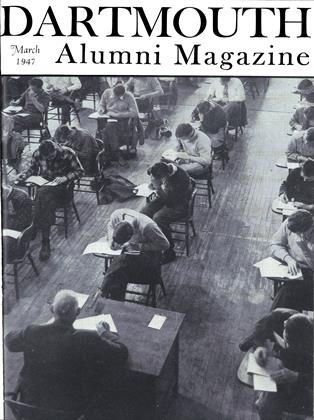By Albert J. George '35.Syracuse Univ. Press, 1946, pp. 130, $2.50.
Anyone who has ever frequented old seaport towns knows the currents of deep unplumbed waters which flow beneath the surface of their busy but calm exteriors. This reviewer, in fact, has often been on intimate terms with many apparently obscure and modest folk who, amazingly enough, although delightfully vague about the whereabouts of such places as Detroit and Duluth, were capable, nevertheless, of equally delightful personal reminiscences about the familiar byways of Canton, Callao, or Manila; and who could communicate subtly by masterly understatement the thrill of a land-fall at Java Head or the quiet but tense anxiety of kedging a safe course through the varied treacheries of a dead calm in the Sundra Straits. Moreover, in later and tamer years, himself following the example of some of those ancient friends of his boyhood days who also closed in gradually on San Francisco by way of Cape Horn or Panama, the reviewer has deep and sympathetic understanding of GreatAunt Di in the book who, with that above mentioned capacity for eloquent understatement so characteristic of Cape Cod folk, was satisfied to observe merely that "the scenery is beautiful." It is this feeling of calmness and lack of visible excitement about foreign or any other parts which Mr. George succeeds in evoking in his Cape Cod folks and which were the familiar attitudes of a more really international age in our historic past. It was an age when people talked less about international cooperation but lived it familiarly in every day life. It was an age when the Cap'n and the Cap'n's Wife dealt with the people of far-distant countries as just so many other ordinary human beings as were their nextdoor neighbors who needed only fair treat ment and understanding on the basis of equality before the eyes of God.
If Mr. George's book does anything other than to evoke the quality of an age, it quietly debunks the recent romantic fiction that there has to be a difference between an "isolationist" and an "internationalist." His Cape Cod like the neighboring Vineyarders and Scrap Islanders to the sou'west and south, demonstrate to us that a fiercely concentrated local pride is often the rich feeding ground of reasonable international friendship and cooperation which are all the more gratifying because they are so very casual. Mr. George's Cap'n's Wife can show- us what in a more maritime and less industrialized period of our history we once were; what, one ventures to say, some have always been; and what most would like to be again. If the book is read with imagination, one might even get from it the notion that in this earlier age the Cap'n and the Cap'n's Wife were true citizens of the larger world because they so truly did the best they could in their own smaller one. Books like this have precisely this ethical and historical value and Mr. George has done a commendable Eunoean job in our present uneasy Lethean dream in strengthening within us the memory of that which once we were by reminding us once again that "tho' much is taken, much abides." For what abides is the simple fundamental fact of common perplexed humanity, wherever one finds it, which driven yesterday by a living gale, logs at the moment: "Light and baffling. So ends this day."
 View Full Issue
View Full Issue
More From This Issue
-
 Article
Article"Free as the Air"
March 1947 By JERRY A. DANZIG '34, -
 Class Notes
Class Notes1918
March 1947 By ERNEST H. EARLEY, DONALD L. BARR -
 Article
ArticleRadio Interprets the News
March 1947 By CEDRIC FOSTER '24, -
 Class Notes
Class Notes1937
March 1947 By JOHN H. DEVLIN, ARTHUR H. RUGGLES JR. -
 Article
ArticlePHYSICS FOR THE FUTURE
March 1947 By PROF. ARTHUR B. MESERVEY '06. -
 Class Notes
Class Notes1921
March 1947 By DONALD G. MIX, ROBERT M. MACDONALD
George C. Wood
Books
-
 Books
BooksIDENTIFICATION OF FIREARMS FROM AMMUNITION FIRED THEREIN—WITH AN ANALYSIS OF LEGAL AUTHORITIES
March 1935 By C. J. Campbell '17 -
 Books
BooksTHE NEW LAND.
OCTOBER 1967 By JERE R. DANIELL '55 -
 Books
BooksFRENCH FOREIGN POLICY DURING THE ADMINISTRATION OF CARDINAL FLEURY, 1726-1743. A STUDY IN DIPLOMACY AND COMMERCIAL DEVELOPMENT.
November 1936 By John G. Gazley -
 Books
BooksSELECTED WRITINGS OF OSCAR WILDE.
JUNE 1969 By JOHN HURD '21 -
 Books
BooksGENERAL INTRODUCTION TO ETHICS
DECEMBER 1929 By Nelson Lee Smith -
 Books
BooksPROCEEDINGS OF THE FIRST ANNUAL NEW HAMPSHIRE BANK MANAGEMENT CONFERENCE. $1.00.
November 1940 By William A. Carter '20
George C. Wood
Books
-
 Books
BooksIDENTIFICATION OF FIREARMS FROM AMMUNITION FIRED THEREIN—WITH AN ANALYSIS OF LEGAL AUTHORITIES
March 1935 By C. J. Campbell '17 -
 Books
BooksTHE NEW LAND.
OCTOBER 1967 By JERE R. DANIELL '55 -
 Books
BooksFRENCH FOREIGN POLICY DURING THE ADMINISTRATION OF CARDINAL FLEURY, 1726-1743. A STUDY IN DIPLOMACY AND COMMERCIAL DEVELOPMENT.
November 1936 By John G. Gazley



